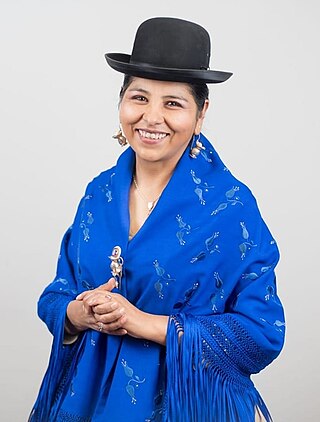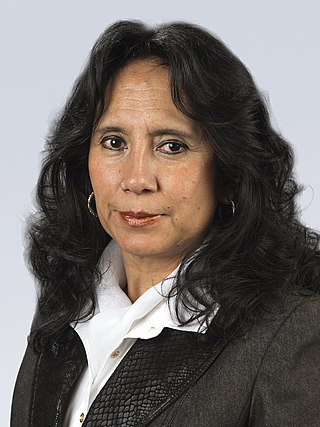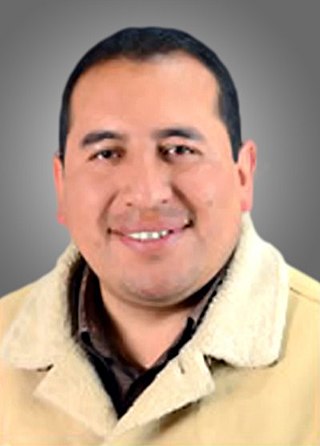
The politics of Bolivia takes place in a framework of a presidential representative democratic republic, whereby the president is head of state, head of government and head of a diverse multi-party system. Executive power is exercised by the government. Legislative power is vested in both the government and the two chambers of parliament. Both the Judiciary and the electoral branch are independent of the executive and the legislature. After the 2014 Bolivian general election, 53.1% of the seats in national parliament were held by women, a higher proportion of women than that of the population.
The National Coordinator for Change is a Bolivian political coordination of social movements aligned with the governing Movement for Socialism-Political Instrument for the Sovereignty of the Peoples (MAS-IPSP). It was founded on 22 January 2007, during the Constituent Assembly of 2006-2007. CONALCAM mobilizes its member organizations in support of the "process of change" which includes the drafting and implementing of a new Constitution as well as a variety of social reforms.
The Ministry of Autonomy is a Bolivian government ministry which oversees the distribution of powers among regional bodies, including departments, municipalities, autonomous regions, and autonomous indigenous governments in Native Community Lands and indigenous municipalities. Through its Vice-Ministry of Territorial Organization, it is also responsible for delimiting boundaries between Bolivia's constituent territorial units.

The Ministry of Cultures, Decolonization, and Depatriarchalization is the ministry of the government of Bolivia that provides for the preservation and protection of the cultures and artistic expressions of the indigenous peoples of Bolivia as well as promotes the country's tourism sector and process of decolonization and depatriarchalization.

Lilly Gabriela Montaño Viaña is a Bolivian physician, politician, and former senator. She was the elected President of the Plurinational Legislative Assembly, a position she accepted and would hold until 2020 while still the presidential representative of Santa Cruz de la Sierra for the Movement for Socialism (MAS) party. In 2012, Montaño was made the acting President of Bolivia for a short time. Montaño is a feminist and vocal defender of the rights of the LGBT community. She has been a regular guest and speaker at forums and conferences in different parts of the world. She married Argentine citizen Fabián Restivo, with whom she has had two daughters.

The Secretary of State for Press, also known as Secretary of State for Communication (SECOM) is a high-ranking official of the Office of the Spanish Prime Minister in charge of the government's communication policy. This position must not to be confused with the Spokesperson of the Government, which is normally one of the Cabinet ministers.

Wilfredo Franz David Chávez Serrano is a Bolivian lawyer, professor, and politician serving as the Attorney General of Bolivia since 12 November 2020 during the government of Luis Arce. He previously served as Minister of the Government from September 2011 to January 2012 during the government of Evo Morales.

Víctor Hugo Zamora Castedo, often referred to as Ojorico, is a Bolivian forestry engineer, politician, and former student leader who served as minister of hydrocarbons from 2019 to 2020. As a member of United to Renew, of which he was president, he previously served as senator for Tarija from 2015 to 2019 in alliance with the Christian Democratic Party. Before that, he served as a member of the Chamber of Deputies from Tarija, representing circumscription 45 from 2010 to 2014 on behalf of the National Convergence alliance. Prior to entering politics, Zamora was active in student unionism and was the chair of the Bolivian University Confederation as well as his Local University Federation. Though unsuccessful in his first electoral bid, Zamora was later given the opportunity to work in the Tarija Prefecture, and in 2004, he was invited by the Revolutionary Left Movement to contest a seat on the Tarija Municipal Council, where he served from 2005 to 2009.

Fernando Iván Vásquez Arnez is a Bolivian geotechnical and mining engineer and politician who served as minister of mining and metallurgy from 8 May to 30 May 2020. He previously served as vice minister of productive development and metallurgical mining from 2019 to 2020 and as director of the environment and public consultation from 2006 to 2011. Shortly into his ministerial term, Vásquez stated that his white complexion made him incapable of being a member of the Movement for Socialism, causing broad condemnation and his removal from office less than a month after being appointed.

The Arce Cabinet constitutes the 222nd cabinet of the Plurinational State of Bolivia. It was formed on 9 November 2020, one day after Luis Arce was sworn in as the 67th president of Bolivia following the 2020 general election, succeeding the Áñez Cabinet. The cabinet is composed entirely of members of the ruling Movement for Socialism. Described as a "technocratic" cabinet, it has been noted for the low-profile and youth of some of its members as well as its political distance from former president Evo Morales.

The cabinet of Jeanine Áñez constituted the 220th and 221st cabinets of the Plurinational State of Bolivia. It was initially formed on 13 November 2019, a day after Jeanine Áñez was sworn-in as the 66th president of Bolivia following the 2019 political crisis, in which the ruling Movement for Socialism government resigned. A second cabinet was formed on 28 January 2020 with all but three ministers being ratified in their positions.

Ana Teresa Morales Olivera is a Bolivian economist, professor, and politician. She was the Minister of Productive Development and Plural Economy of Bolivia from 23 January 2011, to 23 January 2015, during the second government of President Evo Morales Ayma.

María Isabel Fernández Suárez is a Bolivian journalist and politician who served as minister of communication from January to June 2020. Fernández was the final official to serve in that post, with the Ministry of Communication being abolished during her term. She subsequently served as vice minister of communication from June 2020 until the conclusion of the transitional government of Jeanine Áñez in November 2020.

Bertha Beatriz Acarapi is a Bolivian politician and former television presenter serving as a party-list member of the Chamber of Deputies from La Paz since 2020. A member of the Movement for Socialism, she previously served as an El Alto municipal councillor from 2000 to 2004 on behalf of the Revolutionary Left Movement and from 2004 to 2010 on behalf of Plan Progress for Bolivia. During her second term, she served as president of the El Alto Municipal Council from 2006 to 2007, becoming the first woman to assume that post. Outside of politics, Acarapi's lengthy career in radio and television journalism led her to join ATB in 2015, becoming one of the country's first high-profile chola indigenous presenters.

Freddy Mamani Laura is a Bolivian educator, politician, and trade unionist who served as president of the Chamber of Deputies from 2020 to 2022. A member of the Movement for Socialism, he has served as a party-list member of the Chamber of Deputies from La Paz since 2020. He previously served as executive secretary of the National Confederation of Rural Teachers of Bolivia and as departmental executive of the Federation of Rural Teachers of La Paz. Prior to entering politics, Mamani worked as a teacher, serving as the principal of various rural schools in the department.

Mirtha Natividad Arce Camacho is a Bolivian academic, lawyer, and politician who served as senator for Tarija from 2015 to 2020.

Rhina Aguirre Amézaga was a Bolivian disability activist, politician, and sociologist who served as senator for Tarija from 2010 to 2015.

Saúl Octavio Lara Torrico is a Bolivian lawyer, jurist, and politician who has served as a party-list member of the Chamber of Deputies from Cochabamba since 2020. A member of Civic Community, he previously served as vice minister of the interior from 2003 to 2004 and as minister of government from 2004 to 2005. A graduate of the Higher University of San Simón, Lara spent much of his career as a legal advisor and consultant for various public and private institutions and corporations. From 1993 to 1997, he served as chief of staff to Foreign Minister Antonio Araníbar, during which time he joined the minister's party, the Free Bolivia Movement, of which he was secretary of finance. Appointed to head the Ministry of Government in 2004, Lara developed a lasting personal friendship with then-president Carlos Mesa, aiding his 2019 campaign to return to the presidency. The following year, he joined Civic Community's electoral list in the Cochabamba Department, netting a seat in the Chamber of Deputies in the 2020–2025 Legislative Assembly.

Wilson Pedro Santamaría Choque is a Bolivian lawyer, politician, and sociologist who served as vice minister of public security from 2019 to 2020. A graduate of the Higher University of San Andrés with extensive postgraduate studies, Santamaría entered the political field as a partisan of the National Unity Front and served as the party's municipal leader for La Paz. In 2014, he was elected as a party-list member of the Chamber of Deputies, representing the La Paz Department from 2015 to 2019.


















